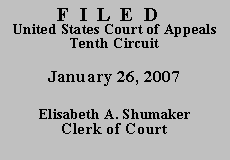 UNITED STATES COURT OF APPEALS
UNITED STATES COURT OF APPEALS
 UNITED STATES COURT OF APPEALS
UNITED STATES COURT OF APPEALS
TENTH CIRCUIT
| ROBERT ALLEN LITTLE, JR., |
|
| v. | |
| RON WILEY, Warden, |
Before TACHA, Chief Judge, HARTZ, and TYMKOVICH, Circuit Judges.(2)
In 1994, a California judge found Little guilty of fire-bombing a residence and sentenced him to one-hundred months imprisonment (eight years and four months). As a juvenile, Little was sent to the California Youth Authority (CYA) to serve his time. Little was in custody of the CYA from June 29, 1994 to November 8, 1995, at which point he was paroled to the United States Marshal Service (USMS) because federal charges had been initiated against him in the federal District Court for the District of Utah.
Little's indictment arose from the bombing of a dormitory at a local college in St. George, Utah, before his state sentence was imposed. Little moved to St. George in the summer of 1993, where he was known to have affiliated with a skinhead organization manifesting racial hatred. During late September or early October, 1993, Little told friends that he was going to explode a bomb at a local college dormitory. On October 10, 1993, a homemade pipe bomb exploded outside a dormitory occupied by two black students. Between November 1995 and August 1996, Little was tried as an adult, convicted, and sentenced to twelve years for Malicious Destruction with Use of an Explosive and Civil Rights Violations in violation of 18 U.S.C. § 844(i) and 42 U.S.C. § 3631(a).
Little was returned to the CYA on August 8, 1996, to resume his California sentence. After having served just two years and eight months of his juvenile sentence, Little was paroled to the USMS in 1997 to begin serving his federal sentence. Little claims he was entitled to good time credits for the period spanning his initial release to temporary federal custody for trial (August 8, 1996) and the day on which he began serving his federal sentence (January 21, 1997). Contrary to the magistrate judge's assertion that this 14-month, 13-day period was properly applied against his juvenile sentence, Little argues that his juvenile commitment at CYA was merely a "civil commitment" and not a sentence for purposes of applying credits for good time served under federal law.
Little asserts his right to federal credit for good time served under 18 U.S.C. § 3585, which provides that a defendant "shall be given credit toward the service of a term of imprisonment for any time he has spent in official detention prior to the date the sentence commences -- that has not been credited against another sentence." Based on the materials in the record, the magistrate judge concluded Little was serving a state sentence prior to his parole on November 8, 1995 to stand trial and that the subsequent detention was properly credited to that state sentence. Little affirms he was in the custody of CYA at this time but argues that a juvenile adjudication is not technically a "sentence" and, thus, the last 14 months of his incarceration (a portion of which he spent in USMS custody awaiting trial) was never properly credited.
Little is not entitled to double credit for his time served at CYA. See United States v. Wilson, 503 U.S. 329, 337 (1992) (§ 3585 is clear that prisoners may not receive double credit for detention time). Accordingly, if Little previously received state credit for the fourteen months at issue in this case, he is not entitled to federal credit for that same period. Jefferson v. United States, 389 F.2d 385 (2d Cir. 1968). The magistrate judge was unequivocal in his conclusion that Little received credit for time served against his state sentence and we defer to that finding.
As for Little's legal argument that a juvenile adjudication does not constitute a sentence for purposes of crediting time under 18 U.S.C. § 3585, our case law suggests the opposite. The Tenth Circuit recognizes the confinement of juveniles as a sentence. See, e.g., United States v. Alberty, 40 F.3d 1132 (10th Cir. 1994) (defendant's sentences in two juvenile hearings ran concurrent to each other); United States v. Miller, 987 F.2d 1462, 1465 (10th Cir. 1993) (juvenile sentences may be used to add points to defendant's criminal history category). See also USSG § 4A1.2(d)(2)(A) (permitting a two-point increase for "each adult or juvenile sentence to confinement of at least 60 days" if confinement was within five years of instant offense) (emphasis added).
Accordingly, we find no error in either the magistrate judge's Report and Recommendation or the district court's opinion adopting the conclusions of the magistrate judge.
For the reasons stated above, we AFFIRM the district court's denial of Little's 28 U.S.C. § 2241 petition. In addition, we DENY his application to proceed IFP.
Entered for the Court
Timothy M. Tymkovich
Circuit Judge
*. This order and judgment is not binding precedent except under the doctrines of law of the case, res judicata and collateral estoppel. It may be cited, however, for its persuasive value consistent with Fed. R. App. P. 32.1 (eff. Dec. 1, 2006) and 10th Cir. R. 32.1 (eff. Jan. 1, 2007).
2. After examining the briefs and the appellate record, this three-judge panel has determined unanimously that oral argument would not be of material assistance in the determination of this appeal. See Fed. R. App. P. 34(a); 10th Cir. R. 34.1(G). The cause is therefore ordered submitted without oral argument.